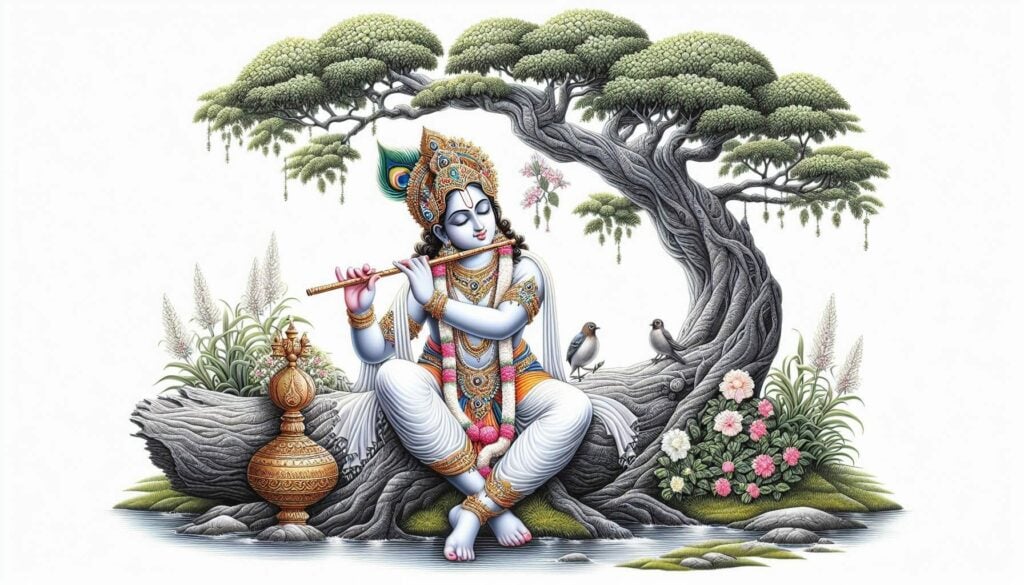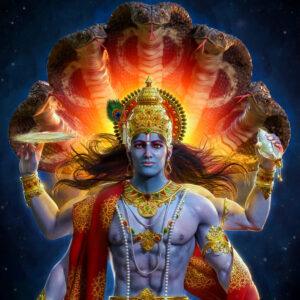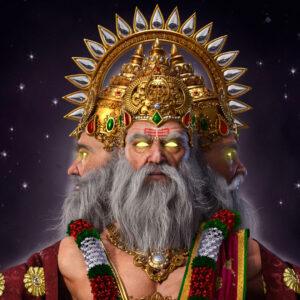
Krishna, the eighth avatar of Vishnu in Hindu mythology, is revered as the supreme god himself. He holds the esteemed position of being the Hindu god of compassion, protection, and love. Considered a major deity in Hinduism, Krishna is not only known as the eighth incarnation of Vishnu but is also recognized as the Supreme God in his own right. His role extends beyond being a deity, as he is regarded as the preserver and protector of the universe in Hindu mythology.
In the rich tapestry of Indic languages, Lord Krishna is known by various names that reflect his divine essence. Some of these names include Achyuta, Damodara, Gopala, Gopinath, Govinda, Keshava, Madhava, Radha Ramana, and Vāsudeva. Additionally, he is also known as Madhusudhana, Manmohana, Kanha, Ranchhod, Hrishikesha, Janardana, and Dwarkadish. The myriad names highlight the multifaceted nature of Krishna and the multitude of ways in which he is revered.
One of the significant aspects of Krishna’s worship is the recitation of his 108 names. These names encompass his divine qualities and serve as a means of devotion. Some of the names include Balgopal, Bali, and Chaturbhuj. Furthermore, the Vishnu Sahasranama, a comprehensive list of Vishnu’s thousand names, also includes numerous titles and names of Krishna. This serves to emphasize his importance and prominence within the Hindu pantheon.
Krishna’s philosophy encompasses profound teachings that provide guidance on various aspects of life. Among his key teachings are the beliefs that love and compassion are the keys to happiness and that relationships form the foundation of human society. According to Krishna, it is crucial to treat everyone with respect and kindness, irrespective of their social status. He also emphasizes the transient nature of life, asserting that everything, including happiness and unhappiness, comes and goes.
The Bhagavad Gita, a revered Hindu text, encapsulates Krishna’s teachings on ethics, spirituality, and the nature of reality. It delves into profound themes that offer insights into the essence of existence. Some of the key teachings in the Bhagavad Gita revolve around the eternal nature of the soul, the importance of selfless action, and the pursuit of spiritual enlightenment.
Krishna’s teachings are rooted in the understanding that the soul is eternal, neither taking birth nor dying. This concept forms the essence of the Bhagavad Gita and provides solace and guidance to those seeking a deeper understanding of life’s mysteries. He advises individuals to cultivate a calm mind, relinquish attachment to results, treat everyone equally, avoid stress, embrace change, and act with readiness.
Krishna’s influence extends beyond his teachings, as he is at the center of numerous captivating stories and legends. Some of the most popular tales associated with Lord Krishna include his birth to Devaki and Vasudeva in Mathura, his profound love for Radha, his idyllic youth spent in Vrindavan, and the abundance of representation in painting and sculpture inspired by the rich variety of legends surrounding his life.
In Hindu art and imagery, Krishna is typically depicted as an anthropomorphic figure with blue-colored skin. This distinct portrayal symbolizes his divine nature and earned him the moniker “the Dark One.” Krishna is often depicted playing a flute, surrounded by divine beings, animals, and gopis (cowherd girls). Another manifestation of Krishna is as Shrinathji, a seven-year-old child depicted in Pichwai paintings. Vaishnava art showcases Krishna in various forms, such as Gopalak Krishna and Bala Krishna. These artistic representations reflect the intense personal devotion (bhakti) that many Hindus have towards Krishna.
Krishna’s significance in Hindu mythology and his teachings on love, compassion, and the transient nature of life make him a beloved deity. His wisdom and guidance continue to inspire millions of people as they navigate the complexities of existence.
Frequently Asked Questions about Lord Krishna:
Q: Who is Krishna in Hindu mythology?
Krishna is the eighth avatar of Vishnu in Hindu mythology and is worshipped as the supreme god himself. He is known as the Hindu god of compassion, protection, and love.
Q: What are the different names of Krishna in various Indic languages?
In various Indic languages, Krishna is known by different names such as Achyuta, Damodara, Gopala, Gopinath, Govinda, Keshava, Madhava, Radha Ramana, and Vāsudeva.
Q: What are some of the key teachings associated with Krishna?
Some of the key teachings associated with Krishna include the beliefs that love and compassion are the keys to happiness, relationships are the foundation of human society, and it is important to treat everyone with respect and kindness.
Q: What is the significance of the Bhagavad Gita in Krishna’s teachings?
The Bhagavad Gita, a revered Hindu text, contains profound teachings on ethics, spirituality, and the nature of reality. It encompasses key themes such as the eternal nature of the soul, selfless action, and the pursuit of spiritual enlightenment.
Q: How is Krishna typically depicted in Hindu art and imagery?
Krishna is typically depicted as an anthropomorphic figure with blue-colored skin. He is often shown playing a flute and surrounded by divine beings, animals, and gopis (cowherd girls). This portrayal symbolizes his divine nature and reflects the intense personal devotion (bhakti) that many Hindus have towards him.


